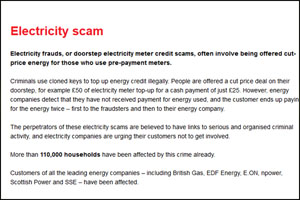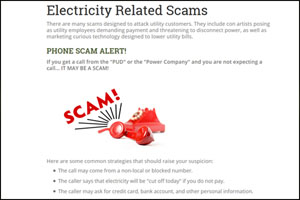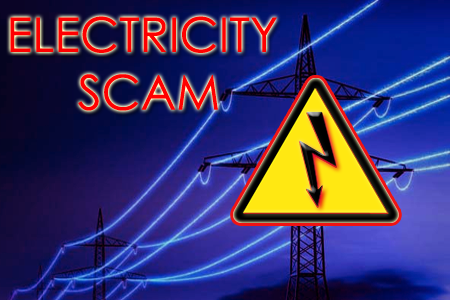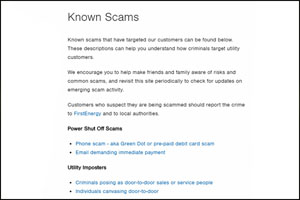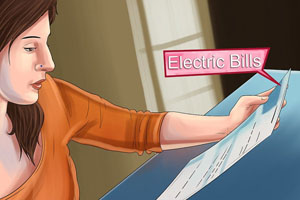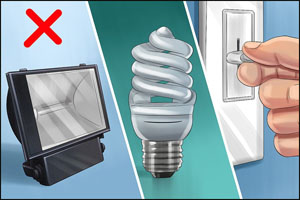Electricity Scams
Electricity scams have emerged as a significant concern, with fraudsters devising clever schemes to deceive unsuspecting consumers. Stay informed and safeguard yourself against fake bills, bogus energy savings offers, and other deceptive practices related to your energy supply.
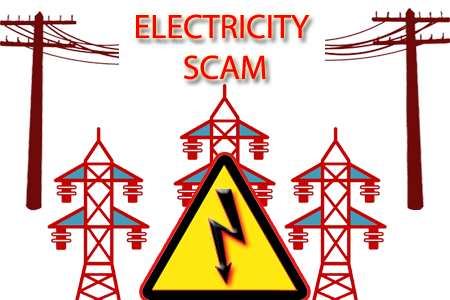 Stay vigilant against electricity frauds, including the increasing menace of doorstep electricity meter
credit scams. These scams play on
the enticing offer of reduced energy bills, capitalizing on people's desire to save on utilities. As
competition tightens in the energy market,
suppliers are in a race to offer the most attractive deals, making customers vulnerable to such
fraudulent activities. Alongside direct utility
bill frauds, there are dubious brokers promising significant discounts, often too good to be true.
Recent reports indicate that over 110,000
households have fallen victim to such scams. It's essential to be informed, stay alert, and ensure you
don't become their next target.
Stay vigilant against electricity frauds, including the increasing menace of doorstep electricity meter
credit scams. These scams play on
the enticing offer of reduced energy bills, capitalizing on people's desire to save on utilities. As
competition tightens in the energy market,
suppliers are in a race to offer the most attractive deals, making customers vulnerable to such
fraudulent activities. Alongside direct utility
bill frauds, there are dubious brokers promising significant discounts, often too good to be true.
Recent reports indicate that over 110,000
households have fallen victim to such scams. It's essential to be informed, stay alert, and ensure you
don't become their next target.
While the aforementioned details are concerning, it's worth noting that the business energy sector is not exempt from these deceptive practices. While a significant number of industry professionals, be it dealers, brokers, or consultants, maintain their integrity and genuinely strive to provide advantageous deals, there exists a manipulative subset with ulterior motives. These unscrupulous individuals exploit their cunning and persuasive skills, luring businesses into energy agreements that predominantly serve the fraudsters' interests. Businesses, like individual consumers, must remain vigilant and informed to navigate safely in today's complex energy market.
How electricity scam works?
- Unexpectedly, you might receive an email from someone pretending to be from a well-known utility company, alleging that you have an outstanding bill for energy consumption from a specific period.
- The "Green Dot Card" scam is becoming increasingly popular among fraudsters. Leveraging fabricated government grants as bait for what is commonly referred to as the "Advance Fee Scam", these swindlers distribute fake grant checks. Subsequently, they convince the victims that a certain bill needs to be settled by adding funds to their debit cards.
How to identify these criminals who target utility customers?
Identifying these deceptive brokers isn't straightforward, given that even the questionable firms boast professional-looking websites. However, there are certain warning signs to be aware of. Before finalizing any agreement, it's crucial to thoroughly assess any prospective third-party intermediary. At times, scammers posing as utility company representatives or energy auditors may show up unexpectedly at your doorstep, offering a free energy leakage assessment. Such unannounced visits should be a cause for concern. Refrain from letting them in, unless you've previously requested an audit or received prior notification from your utility company. Since these scams involve perpetrators alleging ties to governmental electricity programs, always request proper identification and verify their credentials. While these frauds often spike during the high-demand air-conditioning seasons, they can happen at any time throughout the year. Stay vigilant!
Remember, "free energy" is often too good to be true. Before agreeing to any installations related to your energy supply, ensure you fully grasp what you're committing to and at what expense. Always be cautious of individuals pressing for specific payment methods or seeking your banking details. In the face of such situations, always prioritize your safety. Inform your electricity provider immediately if you suspect any foul play. Additionally, consider reporting to local authorities or lodging a complaint with the FTC if you believe you've fallen prey to an electricity scam. Being informed and vigilant can help safeguard you against potential threats.
